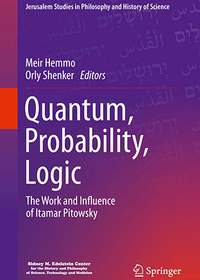
- University of Oxford
- Emeritus Professor
- Academic Concentration: Philosophy of Physics
- Residential Fellow (2017-2018)
- "The Meaning of Probability in Physics"
- Director's Fellow (2018-2019)
- "Probability and Entropy"
Harvey Brown is Emeritus Professor of Philosophy of Physics at Oxford University, and Emeritus Fellow of Wolfson College, Oxford. His previous teaching position was at the State University of Campinas (UNICAMP) in Brazil. He specializes in the foundations of modern physics, mainly quantum mechanics, relativity theory (special and general), thermal physics and the role of symmetries in physics. He is also interested in climate change and the role of forests therein.
Professor Brown is the author of Physical Relativity. Spacetime Structure from a Dynamical Perspective (2005), co-winner of the 2006 Lakatos Award in Philosophy of Science. He has published over sixty journal papers and book chapters on diverse issues in the philosophy of physics, and has co-edited two collections of essays related to the foundations of quantum field theory.
Professor Brown’s research has been supported by grants from the Leverhulme Trust, the British Academy and the Arts and Humanities Research Board in the UK. He has had visiting fellowships at the Departments of Philosophy and Physics at the University of Canterbury, New Zealand; the Perimeter Institute for Theoretical Physics, Ontario; the Institute of Quantum Optics and Quantum Information, Austrian Academy of Science; and the Faculty of Physics at the University of Vienna. In 2007 he was elected Fellow of the British Academy and was President of the British Society for the Philosophy of Science from 2007 to 2009.
Publications
-
Everettian probabilities, the Deutsch-Wallace theorem, and the Principal Principle
Springer, 2020

This paper is concerned with the nature of probability in physics, and in quantum mechanics in particular. It starts with a brief discussion of the evolution of Itamar Pitowsky’s thinking about probability in quantum theory from 1994 to 2008, and the role of Gleason’s 1957 theorem in his derivation of the Born Rule. Pitowsky’s defence of probability therein as a logic of partial belief leads us into a broader discussion of probability in physics, in which the existence of objective “chances” is questioned, and the status of David Lewis’ influential Principal Principle is critically examined. This is followed by a sketch of the work by David Deutsch and David Wallace which resulted in the Deutsch-Wallace (DW) theorem in Everettian quantum mechanics. It is noteworthy that the authors of this important decision-theoretic derivation of the Born Rule have different views concerning the meaning of probability. The theorem, which was the subject of a 2007 critique by Meir Hemmo and Pitowsky, is critically examined, along with recent related work by John Earman. Here our main argument is that the DW theorem does not provide a justification of the Principal Principle, contrary to the claims by Wallace and Simon Saunders. A final section analyses recent claims to the effect that the DW theorem is redundant, a conclusion that seems to be reinforced by consideration of probabilities in “deviant” branches of the Everettian multiverse.